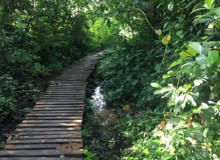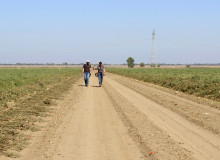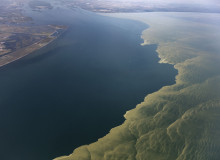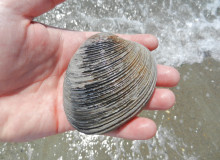Search

A bust of Charles Darwin at the Charles Darwin Foundation. (Christina Trexler/University of Arkansas)
University of Arkansas
Monday, November 04, 2019
"Plasticus Vastum" affects all of our lives, every day, and it is spreading across the Earth at rates unmatched by nearly any other species.
Tags: plastic, galapagos2019, invasive species, evolution, plastic pollution, pollution
Planet Forward
Tuesday, May 19, 2015
On day two of the 2015 Feeding the Planet Summit, we asked our consortium students to send us their reactions to the two-day event. Here's what they had to say:
Tags: feeding the planet 2015
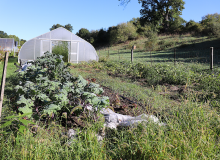
The garden of the Spring Valley Student Farm, a one-acre vegetable garden owned by UConn dining services and run by UConn students in Mansfield, Conn., on Sept. 28, 2022. (Jet Windhorst/University of Connecticut)
University of Connecticut
Tuesday, November 29, 2022
The weather changes in the past few seasons have had detrimental effects on the health of Connecticut soil. Find out how these farmers are adapting.
Tags: agriculture, Soil health, Connecticut, local farming
Ohio University
Thursday, April 01, 2021
In Western Uganda, world-renowned birder Harriet Kemigisha inspires and promotes conservation through her work as a guide, researcher, and community leader around Kibale National Park.
Tags: Uganda, conservation, Community, Biodiversity, public health, women, storyfest2021
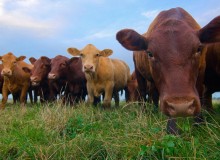
The UN-FAO reports 26% of the planet’s ice-free land is used for livestock grazing. (Ryan Thompson/U.S. Department of Agriculture)
State University College at Buffalo
Monday, September 25, 2017
It ain't pretty: Our food consumption habits are devastating the planet and contributing to world hunger. What can we do about it?
Tags: food, global hunger, global warming, livestock, industry, pollution, methane, agriculture, consumption
Planet Forward
Tuesday, April 04, 2017
A Q&A with our finalists in the Visionary category.
Tags: storyfest2017
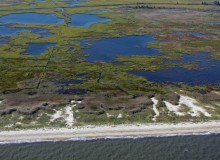
An aerial view of Prime Hook National Wildlife Refuge in Milton, Delaware. Wetlands, like those shown here, has many benefits for a bay's ecosystem, including filtering runoff, mitigating floods, and as a home to baby fish and invertebrates. (Photo courtesy U.S. Fish and Wildlife Service)
University of Delaware
Thursday, July 19, 2018
The health of the Delaware Bay is in question. Human activities, even those at the far reaches of a watershed, can deeply effect a bay's ecosystem. So how can we prevent more damage and work on restoration?
Tags: clean water, waterways, delaware bay, wetlands, pollution, algae, runoff, agricultural waste
Planet Forward Senior Correspondent | Cornell University
Thursday, December 06, 2018
Next in our Tackling Food Waste series: Any food discussion inevitably involves GMOs. Columbia University's Katherine Baker spoke with an organic farmer and plant pathologist/geneticist to find out more.
Tags: woodland, davis, pfincali, agriculture, sustainable agriculture, consumers, skepticism, storyfest2019
George Washington University
Friday, February 07, 2020
The Baltic Sea is choking, and so are many of the creatures that depend on it.
Tags: oceans, pollution, fertilizer, storyfest2020
University of Florida
Tuesday, September 20, 2022
Meet clammers, scientists and volunteers, like TV star Blair Wiggins and three generations of women, who are returning clams to Florida's Indian River Lagoon and other ailing waters to reduce pollution.

